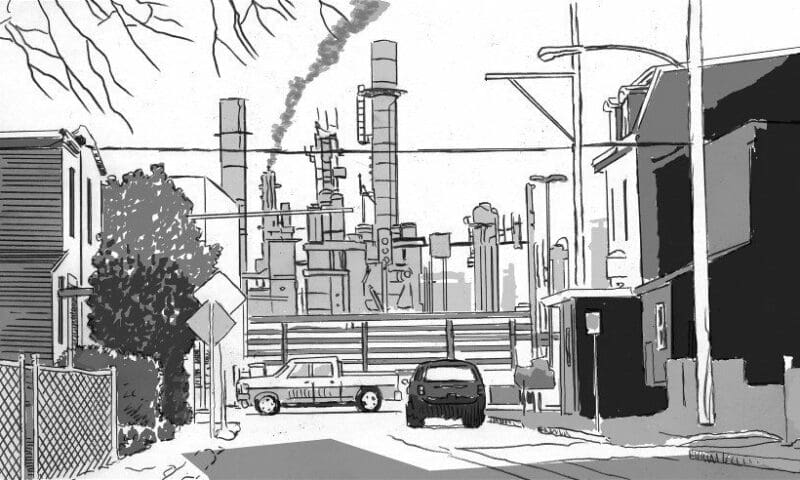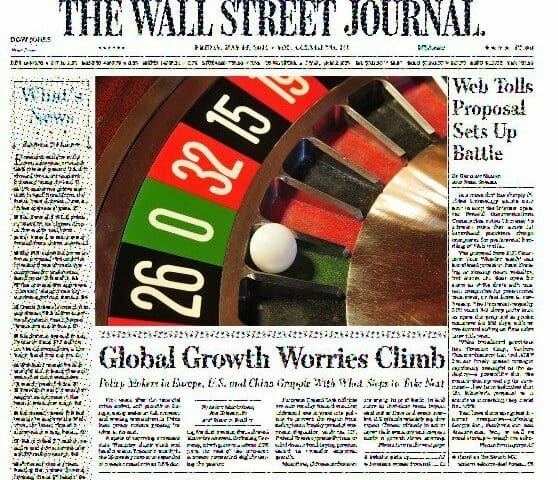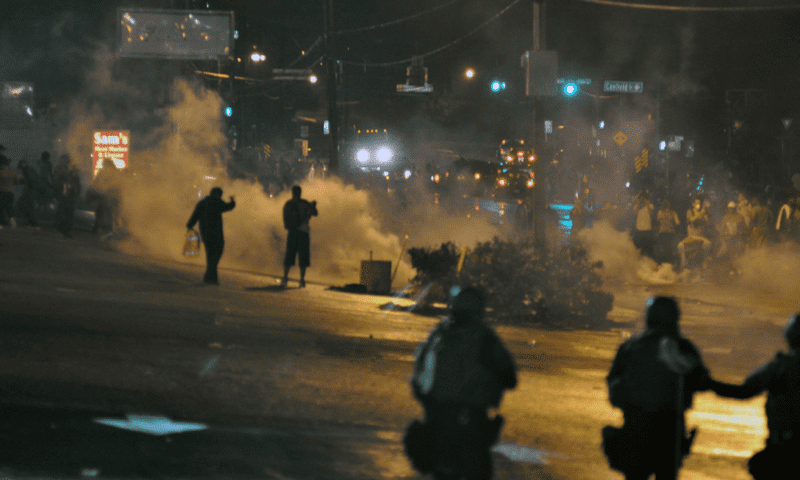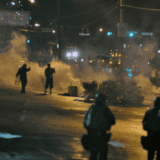


Last week Chicago Bulls basketball star Derrick Rose wore a T-shirt in warm-ups that read “I Can’t Breathe,” protesting the non-indictment of a New York police officer whose chokehold killed Eric Garner. Cleveland Cavaliers superstar LeBron James wore a similar shirt the next night, telling a reporter who asked him after the game if his action was a “Cavaliers thing,” that no, it was a “worldly thing.”
A few days before these pro basketball players’ protests, five members of the St. Louis Rams football team ran out of the team dressing room before kick-off with their hands raised above their heads, a reference to the “don’t shoot” gesture that protesters have been using after the shooting of teenager Michael Brown in Ferguson, Missouri.
Predictable outrage ensued. The St. Louis Police Officers Association issued a statement saying the organization was “…profoundly disappointed” with the five players,


“Man, what can I do?” DeMarkus Williamson paced, hands on his hips, head down. He was dressed in oversized basketball shorts and a tee.
“Teaflake doesn’t strike me as the forgiving sort.” Little Joe said. “But then again, you didn’t steal his money. He’s a logical cat.”
“Still,” the young man said, gesturing with his hands. “It was my girl that done it, and like he’s gonna believe I wasn’t in on it.”
“How much are we talking about?”
“She made off with a shade over twelve grand. Settin’ me up to be the chump.”
“Shit,” Little Joe said, whistling.
The two were in a rear bedroom in a clapboard house in Richmond. Out a translucent-curtained window, the metal spires of the century-old Chevron refinery could be seen in the near distance. Recently the progressives in the city, outspent mightily to the tune of $3 million by Big Oil backing its hand-picked candidates,
» Read more about: The Dixon Family Chronicles: “Live for Today” »


When people think of Los Angeles, what comes to mind first? Maybe Disneyland, Hollywood for sure, perhaps our proximity to the beach, but definitely traffic—the infamous Los Angeles freeway traffic. Is there ever an answer to this omnipresent problem?
Over this past summer, I had the privilege of spending time in Hong Kong, thanks to the Henry Luce Foundation and the Urban Environmental Policy Institute at Occidental College. For six weeks, I explored the area while researching the political and education underpinnings of rooftop farms in Hong Kong. When I made the transition back to L.A., I found myself reflecting on different aspects of life, including food justice and transportation, and making unexpected comparisons between the two places.
Hong Kong has a population of more than seven million people and is one of the most world’s densely populated areas, with about twice the population of Los Angeles.
» Read more about: Hong Kong to L.A.: Reflections on Transit Transformation »


“Public Pensions Need Gamblers Anonymous,” blared the op-ed by the American Enterprise Institute’s Andrew Biggs in the Wall Street Journal last week.
Can it be true? Did the trustees of CalPERS just take retirement funds for 1.7 million Californians – backed up by our tax dollars – to Las Vegas and put it all on black?
Of course not. Biggs is probably talking about speculating through black box investments and shadowy hedge funds, right?
Wrong again. The risky investing strategy we are warned against: the stock market.
As a measuring stick, Biggs trots out the “100 minus age rule,” which says that an individual should invest no more than that percentage amount in stocks and other so-called risky assets. (So a 30-year-old might have 70 percent of his or her investments in stocks and 30-percent in things like bonds,
» Read more about: Pension Cutter Confuses Stock Market With Las Vegas »


A year and a half ago, I wrote an article for the Huffington Post that I called “Will the Killing of Trayvon Martin Catalyze a Movement Like Emmett Till Did?” I pointed out that Rosa Parks was thinking about Emmett Till — a 14-year-old African American who was brutally murdered by two white thugs in Mississippi in August 1955 — when she refused to move to the back of the bus in December of that year and sparked the Montgomery bus boycott which, in turn, triggered the civil rights movement.
At the time, I hoped the answer to my question would be yes, but I wasn’t sure. I wondered whether the protests over the murder of Trayvon Martin, and the acquittal of his killer George Zimmerman, would coalesce into a sustained movement.
Now we can see that, indeed, a movement for social and racial justice has emerged from the Trayvon Martin murder and more recent events —
» Read more about: The Dawn of a New Racial Justice Movement »


With the expensive mid-term elections followed by Thanksgiving and Black Friday, followed by Cyber Monday, you’d think that people wouldn’t have much money left over for Giving Tuesday. But if current trends continue, charitable contributions this year may actually match pre-Great Recession levels. We won’t know about 2014 for a while, but the results are in for last year: Americans gave $335 billion in nonprofit, tax-deductible gifts in 2013.
The vast majority of that money did not come from rich people. Yes, occasionally a Mark Zuckerberg will give away a billion or so, which certainly ups the total. But on the whole, those in the top 20 percent give away about 1.3 percent of their income while those in the bottom fifth donate about 3.2 percent of their incomes. That’s unfortunate because America’s “ultra-rich” population grew by about six percent last year.
If you’re bummed by the recent election and feel like the clock’s been turned back for women’s rights, take yourself to a screening of She’s Beautiful When She’s Angry, the new documentary on the 1970s women’s liberation movement, and get some righteous feminist energy going.
Opening in Los Angeles December 12 at the Nuart Theater, the 90-minute film is jam-packed with footage of energized women challenging the powers that be — from Congressional committees to the medical establishment, from news media to men on the street — demanding basic rights and respect for themselves as citizens, workers, wives and girlfriends.
As a founder of the Chicago Women’s Liberation Union in the 1960s, I have a small part in the film, which thankfully shows the movement as it really emerged, not just in New York, but in communities across the U.S.
It’s hard to imagine what life was like for women back then – want ads were segregated by gender,
» Read more about: Film Review: “She’s Beautiful When She’s Angry” »


With tongue firmly planted in cheek Thursday, a beaming Los Angeles Mayor Eric Garcetti credited two secret weapons for helping him break a deadlock among a labor coalition, civic groups, Kinkisharyo International LLC and the city to craft a compromise to save jobs and keep construction of new light rail cars in Palmdale: “bad pizza and smaller meeting rooms.”
Garcetti also serves as chair of the county’s transit authority, Metro. His self-deprecating quip garnered a hearty laugh while setting the tone for a mostly celebratory morning press conference to announce the new agreement before Thursday’s regular Metro board meeting.
In addition to the mayor and Kinkisharyo reps, news conference attendees included L.A. County Supervisor Mike Antonovich, Palmdale Mayor Jim Ledford Jr., Executive Secretary-Treasurer of the Los Angeles County Federation of Labor Maria Elena Durazo and Antelope Valley business group leaders.
All of the speakers heaped praise upon Garcetti for taking the lead in this 11th-hour process to broker the deal.
» Read more about: How Negotiators Erased Lines Drawn in the Sand to Create Jobs »
I recently sat down with actor Ed O’Neill, best known for his role as Al Bundy in the Fox TV Network sitcom, Married With Children, and who is currently starring in ABC’s award-winning comedy, Modern Family, which will be honored next week at the Los Angeles Alliance for a New Economy’s 2014 City of Justice Awards Dinner. Here’s the second in a series of clips from that interview. (Full transcript here.)
» Read more about: Watch Now: Actor Ed O’Neill on His Teamster Roots »


California pension cutters suffered another setback last week when a state appellate court rejected their claims that ballot language written by Attorney General Kamala Harris showed political bias.
The decision by Sacramento’s 3rd District Court of Appeal “dismissed as moot” San Jose Mayor Chuck Reed’s appeal of a lower court ruling. This effectively leaves in place Sacramento Superior Court Judge Allen Sumner’s March decision that Reed had failed to prove Harris’ ballot summary was misleading.
“We’re not going to get a hearing on the merits,” Reed told Capital & Main. “It shows how difficult it is to try to get through the court system in an election cycle; it means you have to start earlier.”
Legally, the two rulings sound a final death knell for Reed’s contentious statewide campaign to put his self-described Pension Reform Act of 2014 before California voters. In practical terms,
» Read more about: Pension Cutters Lose in Court, Vow 2016 Ballot Bid »